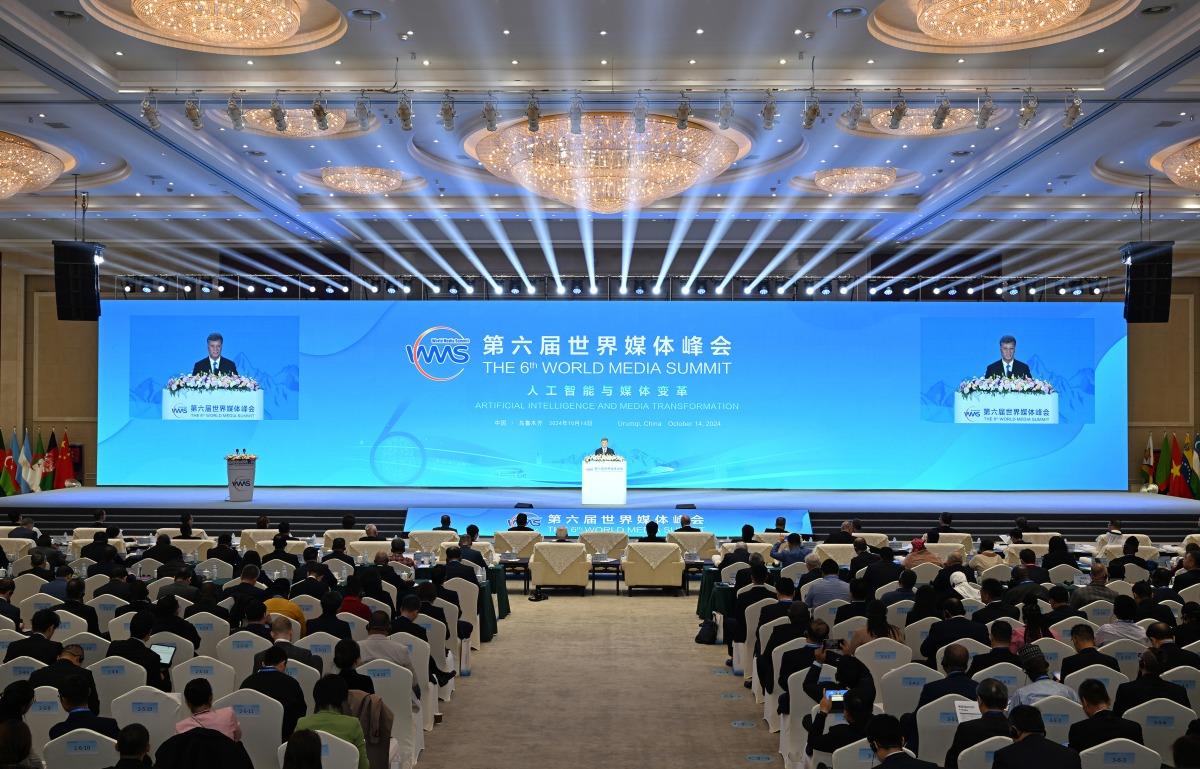
'Xinhua Seeks To Work With Peers For Transnational AI Media Lab'
Urumqi, Xinjiang: The media leaders and journalists from around the globe gathered in Urumqi to explore challenges posed by the artificial intelligence to media ethics and propose suggestions to counter the negative influence of technology while fully using emerging technologies in the media industry.
The 6th World Media Summit opened on October 14 at Xinjiang International Convention and Exhibition Center in Urumqi, capital city of northwest China's Xinjiang Uygur Autonomous Region.
Themed“Artificial Intelligence and Media Transformation,” the summit gathered over 500 participants from 106 countries and regions, including representatives of 208 mainstream media outlets, government agencies and international organisations. The event was co-hosted by Xinhua News Agency and the regional government of Xinjiang.
The opening session of 6th WMS was addressed by Fu Hua, President of Xinhua News Agency; Ma Xingrui, Member of the Political Bureau of the CPC Central Committee; and Chen Wenjun, Deputy Secretary-General of the Publicity Department of the Communist Party of China Central Committee among other speakers from across the globe.
Fu Hua, President of Xinhua News Agency, said in his keynote address,“We should proactively align with the technological wave, closely track the advancement of AI, particularly generative technologies like ChatGPT and Sora, and seize every opportunity for media innovation.”
Describing opportunities and challenges that AI brings to media development as“enormous, even disruptive,” Fu underlined the importance of“humans having the final say in human-machine interaction.”
“We should move beyond 'tech-centric thinking' and effectively leverage the initiative of editors and reporters,” he said.
Fu said Xinhua is willing to work with media peers to establish a transnational, cross-regional AI media lab. He emphasised the importance of enhancing AI-related experience and achievement sharing to help bridge the“digital divide,” calling on global media to set professional standards to maintain journalistic ethics in the AI era.
Speaking at the summit, Andrey Kondrashov, Director General of Russian news agency TASS, said that AI serves merely as a tool.“Media's primary responsibility - creating high-quality content that is authentic, trustworthy, and meaningful - still rests with people,” Kondrashov said.
Gan Ling-Sze, Vice-President of Reuters News Agency Asia Pacific, said that the advancement of generative AI will bring an increased risk for well-produced misinformation and disinformation.“In a world where there is so much content, the need for trusted sources of news, robust fact-checking and transparency will only grow.”
In his speech, Ma Xingrui, secretary of the Xinjiang regional committee of the Communist Party of China, described the summit as a great opportunity for journalists to gain firsthand experience of Xinjiang.
“Through platforms like the World Media Summit, we have the chance to forge stronger partnerships with global media organisations,” Chairman of the Editorial Board of Independent Media Viasen Soobramoney said in his speech.
“These partnerships are essential, not just for Africa but for the global media landscape,” Soobramoney said in his speech at the opening ceremony of the 6th World Media Summit.
The summit, which brought together the brightest minds in global media, offered an opportunity to reimagine how media can drive forward Africa's growth and how strengthening exchanges between nations can open up new avenues of prosperity.
Read Also-
'Transparency, accountability and ethical considerations will remain at the heart of media practices in Qatar'
He further said that as media practitioners,“we have the power to connect people across borders, create platforms for dialogue, and share innovations that can drive development.”
Soobramoney added that the media is not just a mirror reflecting our reality; it is a powerful tool for shaping perceptions, fostering dialogue, and driving change.
“This summit is not just about discussing the issues we face; it is about finding common ground and working together to address those issues in a way that benefits all,” said Soobramoney.“Let us work together to create a global media landscape that is inclusive, representative, and focused on driving positive change.”
A global survey conducted by Xinhua Institute, a think tank under Xinhua, was also part of a think tank report titled,“Responsibility and Mission of News Media in AI Era,” which was unveiled at the 6th World Media Summit.
Boasting a diverse cultural tapestry, Xinjiang, with about one-sixth of China's territory, has demonstrated robust economic growth in recent years. In 2023, it ranked among the top five provincial-level regions nationwide across six major indicators, including GDP growth, investment levels, consumption rates, and income of residents.
Located at the heart of the Silk Road Economic Belt, Xinjiang is becoming increasingly vital as a hub connecting Asia and Europe while serving as a key gateway for China's westward opening up.
Established in late 2023, the China (Xinjiang) Pilot Free Trade Zone, which comprises three iconic areas in Urumqi, Kashgar, and Horgos, and the region's integrated bonded areas have become important engines driving Xinjiang's foreign trade.

Legal Disclaimer:
MENAFN provides the
information “as is” without warranty of any kind. We do not accept
any responsibility or liability for the accuracy, content, images,
videos, licenses, completeness, legality, or reliability of the information
contained in this article. If you have any complaints or copyright
issues related to this article, kindly contact the provider above.

















Comments
No comment